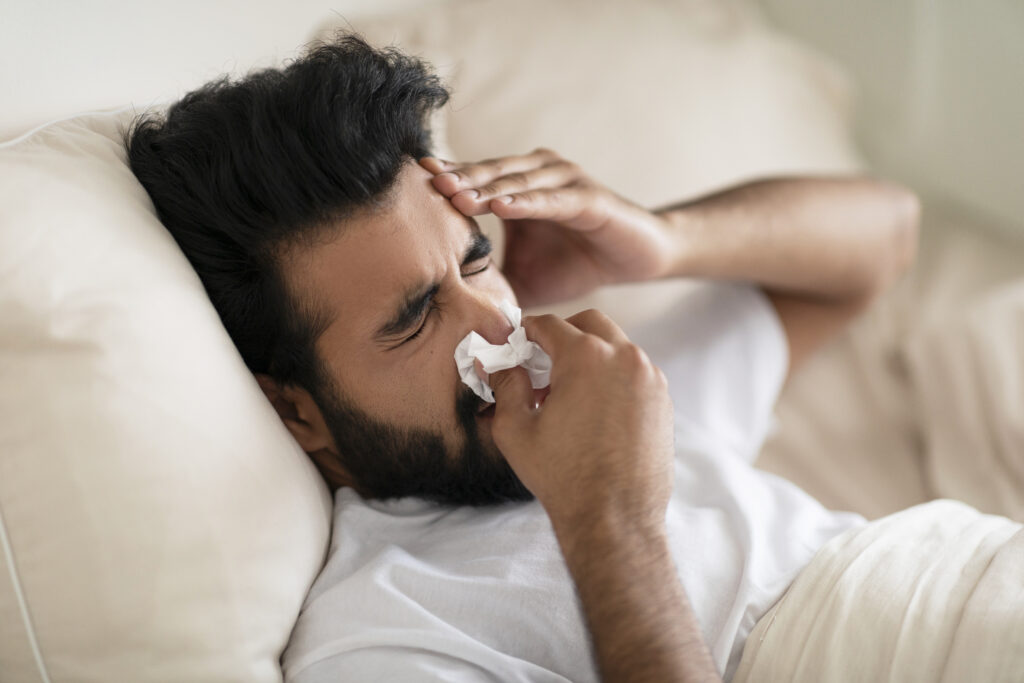
Allergies are a problem year-round, whether seasonal or all the time: to pollen and dust, pets, and mold. However, many tend to wonder what most of them ask during the allergy season, i.e., can allergies elevate your temperature? The knowledge of the impact of allergies on the body and whether they can lead to a real fever can make you understand when to stay at home and when to address a doctor.
Avant Medical Group assists patients in treating allergy problems and other health-related issues. This guide helps to understand whether allergies lead to low-grade fever, its symptoms, and ways of getting help.
Do Allergies Cause a True Fever or Just a Feeling of Warmth?
The question “Can allergies raise temperature?” often arises because allergies alone do not lead to an actual fever. Allergies are a response to inoffensive substances by your immune system, such as pollen or animal dander. Once your body starts producing histamines to combat these allergens, you may experience a flushed or warm feeling or feel slightly weary, although your central temperature tends to remain at normal levels.
But allergies sometimes cause sinus blockages that may turn into a bacterial sinus infection, such as sinusitis. These secondary infections can produce a true fever.

Common Allergy Symptoms That Can Feel Like a Low-Grade Fever

Even though allergies do not directly cause a fever, they may generate conditions that make you feel like you have one, prompting questions like “Can allergies raise temperature?” These include:
- Blocked nose: Swelling in the nasal tracts causes heat accumulation in the head and face area.
- Pressure of the sinus: Congested sinuses can cause heaviness and a warm, tired head.
- Fatigue and malaise: Allergic reactions can make you feel tired, similar to having a minor cold.
If your body temperature exceeds 100.4°F (38°C), the cause is likely more serious than just allergies.
How to Tell the Difference: Allergies vs. Cold or Flu
It is not always simple to diagnose yourself to know whether you are down with allergies, a cold, or the flu. This is how to note the difference:
- Allergies: Runny or clear mucus, sneezing, itchy eyes, and watering eyes, and there will be no fever; the symptoms usually cover the duration of the exposure to the allergen.
- Cold: Sneezing, runny nose, slight drowsiness, sore throat, and in certain cases a slight fever, which normally passes within a week.
- Flu: The symptoms are sudden high fever, body aches, chills, extreme fatigue, and occasionally nausea. Symptoms of the flu tend to be more severe than a cold, and they also appear suddenly.
When your fever does not go away or you have mucus that is thick and yellow or green, you could be infected and require a doctor to treat you.
When Should You Worry About a Fever with Allergies?
Allergies at times may lead to conditions associated with fever:
- Inflammation of the nose (sinusitis): A stuffy nose caused by allergies can also cause bacteria to accumulate in your sinuses, causing an inflammatory reaction, pain or pressure in the face, and a true fever.
- Ear infection: The buildup of fluid in the nose may flow into the middle ear area, which makes an earache, muffles hearing, and also causes a fever as long as it is infected.
- Asthma exacerbation: In cases of severe allergic reactions asthma can be aggravated, resulting in wheezing, tight chest and a feeling of shortness of breath that sometimes can overlap or seem similar to signs and symptoms of infection.
Consult the doctor immediately in case you encounter facial pain, facial swelling, and ear pain, as well as a fever that lasts past a few days. Avant Medical Group specialists will be able to diagnose infection and assist you in receiving appropriate treatment. Explore our services for personalized allergy care.
Tips to Prevent Allergy-Related Infections
The following simple tips will help avoid the complications caused by allergies:
- Use anti-allergy pills: Non-prescription antihistamines and nasal sprays can aid in the decrease of inflammation and keep the nasal openings clear.
- Apply saline rinsing: Perform saline irrigation often to eliminate allergens and mucus that might become congested, leading to sinusitis.
- Keep hydrated: Drinking lots of water thins mucus, thereby slimming the chances of sinuses or blocked ears.
- Maintain clean indoor air: An air purifier, a HEPA-equipped vacuum, and a regular change to the HVAC filters will lower the concentration of dust, pollen, and mold indoors.
- Visit a specialist in allergies: Having a customized plan in overcoming allergies provided by a specialist place like Avant Medical Group would not only assist you in avoiding complicated and frequent triggers, but it would also enable you to avoid allergy attacks altogether, even through seasons.
Avant Medical Group provides personalized services to patients who have allergies, such as testing, immunotherapy, and advanced sinus services.
When to Visit Avant Medical Group
It is not advisable to wait when the allergy symptoms are persistent even with over-the-counter relief drugs or even when one starts showing symptoms of a sinus infection or ear infection. Avant Medical Group has a passionate staff of medical professionals who offer all-inclusive care, diagnosis, and advanced treatment services.
Conclusion
Do allergies increase temperature? Not directly, but they are able to make you feel hot and uncomfortable. Chances are that you could have an infection that made you develop a real fever due to your allergies. Knowledge of the difference can guide you on the time to rest and when to go to the health facility.
When you can no longer endure seasonal or chronic allergies, allow Avant Medical Group to come into your life with help to breathe easier and remain healthy. You can reach us today to book your appointment.
Visit our blogs for more health insights.
Frequently Asked Questions (FAQs)
Answer: Seasonal allergies rarely cause a “true fever.” If you suspect you are experiencing a low-grade fever, it is usually related to a mild viral infection.
Answer: You should check for other symptoms. Allergies are characterized by clear mucus drainage and may cause itchy eyes. An infection typically presents with colored mucus drainage, facial pain, and fever.
Answer: If you feel mildly warm but don’t have an actual fever from an infection, you should rest and manage your allergies. Otherwise, if you have a fever that is persisting, I would recommend a visit to your family doctor.
Answer: Severe allergies can cause fatigue and congestion, but they will not cause a high fever or body aches like the flu.
Answer: If you have developed a sinus infection due to allergy management, you will need to be treated with antibiotics and possibly have an augmented allergy management plan. Please visit the Avant Medical Group, and we would be happy to assist you.
